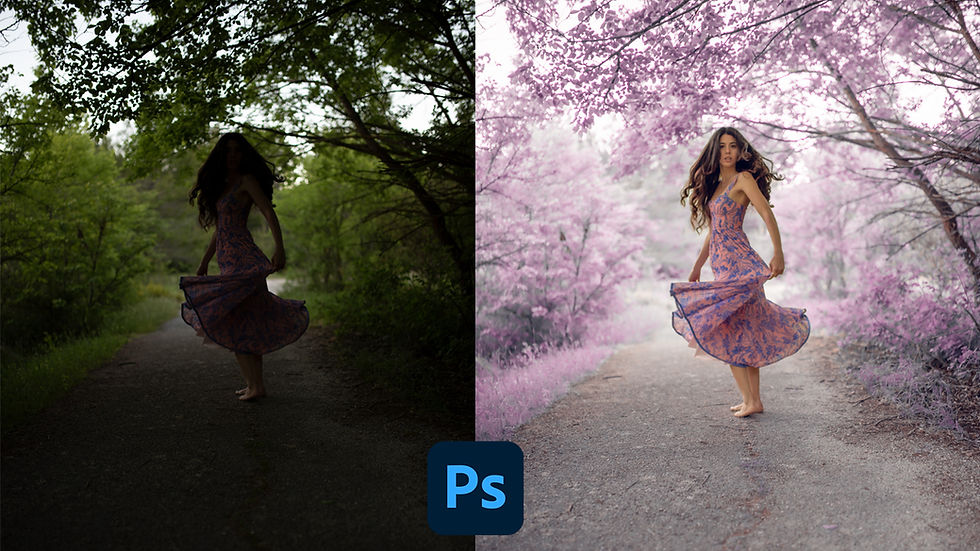What Will Photography Look Like in 10 Years?
- Nickos IV

- Apr 13
- 4 min read
Updated: Aug 14

Photography has always been an evolving field, shaped by technology, trends, and artistic vision. As we look forward to the next decade, we can expect remarkable changes that will transform how we capture and share images. This post explores potential advancements in photography, focusing on technology, creativity, and culture.
The Rise of AI in Photography
Artificial Intelligence (AI) is making waves across various industries, and photography is no exception. Over the next few years, we can expect AI tools to assist photographers during every stage of their work, including editing, composition, and even shoot planning.
Imagine a camera equipped with AI that analyzes a scene in real-time. It could suggest ideal settings based on lighting, location, and subject matter. This eliminates the guesswork for photographers, allowing even novices to take stunning photos. In fact, AI algorithms can now fix blemishes and enhance images in a fraction of the time it takes a human editor.
By incorporating these smart sensors and advanced algorithms, photographers can focus more on their creativity. This shift could lead to innovative shots that were once difficult without extensive technical skills. For example, a recent study found that 70% of amateur photographers reported feeling more confident using AI-driven editing tools.
Mobile Photography Advances
As smartphones continue to dominate the photography scene, further innovations will bring professional-grade capabilities to everyday users. The evolution of mobile sensors promises features that were previously exclusive to high-end cameras.
Envision smartphones with multiple specialized lenses for different scenarios. Users could seamlessly switch from capturing ultra-wide landscapes to intimate portraits. Emerging features like computational photography could enhance low-light conditions, making it possible to take clear, vibrant shots in dim environments. A survey indicated that nearly 80% of people prefer using their phones for photography due to convenience.
With the growing influence of social media, mobile photography will inspire trends that celebrate creativity. Platforms like Instagram and TikTok will motivate users to blend high art with candid moments. In this way, photography will become more integrated into our daily lives.
Immersive Experiences and Virtual Reality
Virtual reality (VR) is slowly becoming mainstream, and its combination with photography has the potential to change how we experience images. In ten years, we might see immersive photo experiences that allow viewers to “step inside” a photograph.
Imagine photographers creating VR galleries where individuals can engage with landscapes or events from various angles. This could revolutionize travel and documentary photography, enabling viewers to feel connected to the subject in a way static images cannot. A recent report highlighted a 50% increase in VR adoption for creative industries.
Such interactive experiences could inspire new storytelling methods. Photographers could convey deeper emotions and narratives, transforming how we perceive visual art. The lines between photography and virtual reality would certainly blur, enriching the viewer's experience.
Sustainable Photography Practices
As environmental awareness rises globally, sustainability will shape photography practices. In the coming decade, many photographers might adopt eco-friendly methods, utilizing sustainable materials for prints and gear to reduce their carbon footprint.
We could see a community of photographers championing conservation through their art. By highlighting environmental challenges in their work, they can inspire viewers to take action. Research indicates that 65% of consumers prefer brands dedicated to sustainability, which means eco-conscious clients may increasingly choose photographers committed to green practices.
Using renewable energy sources for tools and adopting better recycling methods will likely become standard. This shift toward sustainability won't just reflect a trend; it can build a strong foundation for how photographers communicate their messages to the world.
The Influence of Social Media Platforms
Social media has already transformed photography, and the upcoming decade may bring even more evolution. New platforms tailored specifically for photographers might emerge, focusing on high-quality visuals and artistic integrity over mere virality.
With algorithms centered on engagement rather than superficial likes, photographers will need to adjust strategies and enhance storytelling skills. Statistics show that 90% of users seek authenticity over perfection, making it crucial for artists to convey genuine moments.
As platforms evolve, they will redefine how photographers share work and connect with their audiences. Features like augmented reality filters could open new creative avenues, providing exciting ways for users to interact with photographs and engage with artists.
The Democratization of Photography
The future of photography likely leans toward greater accessibility, as technology helps make high-quality equipment and education more widely available. Knowledge sharing will thrive in online communities and workshops, empowering aspiring photographers to master their craft.
With abundant free resources, individuals from diverse backgrounds can learn photography and showcase their unique viewpoints. This influx of fresh perspectives can diversify the field and inspire innovations. For instance, up to 1 in 3 young photographers today learned their skills through online platforms.
Online learning resources will empower anyone passionate about photography to produce powerful and artistic images. In this inclusive environment, emerging voices will shape the future of photography through exciting new transformations.
Looking Ahead
As we consider the future of photography, it is set to be a vibrant blend of technology, creativity, and community. Upcoming advancements in AI, mobile photography, immersive experiences, sustainable practices, social media influence, and the democratization of art will open new avenues for exploration.
Whether you are a seasoned pro or just starting your photography journey, staying aware of these trends can inspire you and inform your approach. By embracing these changes, photographers can capture the essence of life in all its complexity.
The future of photography promises to be exhilarating, as new innovations offer fresh ways to express artistic vision. So, get ready; ten years from now, photography will be more dynamic and colorful than ever!
Remember, we offer photography courses designed specifically for amateur or intermediate photographers like yourself.








Comments